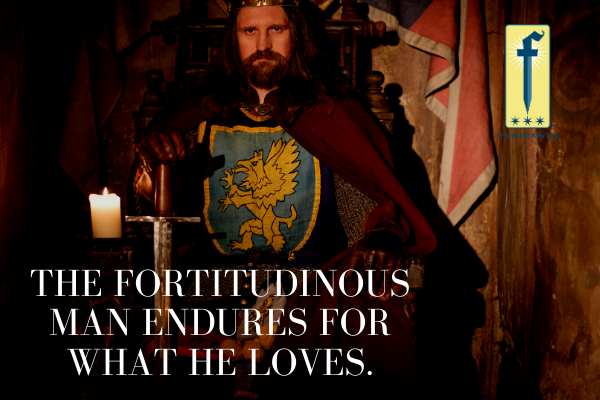The Fortitudinous Man Endures for What He Loves

more hate can mean more endurance
- by Jason Craig
One of the great errors of today’s sloganeering society is the demand we choose love or hate. Hate is when you don’t accept a person as they are, or something. Love is when you let the person by who they are, or something.
But love and hate are – to borrow another vogue word – binaries. They’re two sides of the same coin. Hate is a byproduct of love; it grows because of love. And, yes, violence can grow out of hate.
Jesus actually tells us plainly we must hate: “If any man comes to me, without hating his father and mother and wife and children and brethren and sisters, yes, and his own life too, he can be no disciple of mine” (Luke 14:26). Obviously, this is a rhetorical device, because scripture itself confirms these natural loves. St. Ambrose explains this verse in that very way, that submitting to the truth as revealed by nature means that we must submit ultimately to “the Author of nature, and depart not from God out of love for parents.”
In other words, we hate the things that threaten what we love and cherish. As Jesus says, where our treasure us there too is our heart, and wherever our treasure so too are our fists in defense of them.
I hate, therefore, the man that enters my house to do violence to my family.
This is also why St. Thomas Aquinas lists hatred of God as a “daughter” of lust. Such hatred flows from lust because lust distorts love and pleasure into self-focus, instead of tempering it toward the common and individual good. God, by being the author of pleasure and thereby having the audacity to define its limits and direction (i.e. telling you that no, sodomy, masturbation, homosexuality, and fornication are not legitimate expressions of human sexuality) becomes the object of hate.
As an aside, the opposite of love is indifference. To have no fight in you is to have no love in you. The opposite of love is not a fist of anger, but a shrug and “whatever.” There’s no fight because there’s nothing worth fighting for. The question of disordered love, however, is a worthy one – whether we love the right things in the right ways.
Back to the coin of love/hate: There simply are things in life that cannot be loved at the same time – we must “hate the one and love the other,” as Jesus said (Matt. 6:24). And much of the time to discern what we really love we can discern what really gets our blood boiling. Does the thought of someone disrespecting you totally derail your inner peace? Losing money? Position?
A man sliding into pornography does not look to the crucifix on the wall as the website loads, because in that moment he hates the God who denies him what he will not deny himself. Later he may repent and hate that same website, but this reveals the insecurity and instability of his inner man and the need to mature in love, not merely grow in discipline.
In Fraternus, when we try to hone a virtue like fortitude, we are careful to note why we have fortitude. What brings it to life. If we lack the endurance to live a life of virtue, we must turn inward to see what is enthroned in our heart. If love animates our virtues, which it must to be Christian virtue, our endurance will not be for the sake of discipline itself, but for love. When our fortitude is lacking, we need to hate better. And to hate better, we need to beg God to increase our love for what is good, true, and beautiful – we need a greater love of God Himself. The fortitudinous man endures for what he loves. Find out what he loves and you’ll know why and what he’ll endure.
From Eusebius, quoted in The Catena Aurea:
For every man naturally dwells upon that which is the object of his desire, and thither he directs all his thoughts, where he supposes his whole interest to rest. If any one then has his whole mind and affections, which he calls the heart, set on things of this present life, he lives in earthly things. But if he has given his mind to heavenly things, there will his mind be; so that he seems with his body only to live with men, but with his mind to have already reached the heavenly mansion.
Catechism 2848: “Lead us not into temptation” implies a decision of the heart: “For where your treasure is, there will your heart be also. . . . No one can serve two masters.” “If we live by the Spirit, let us also walk by the Spirit.” In this assent to the Holy Spirit the Father gives us strength. “No testing has overtaken you that is not common to man. God is faithful, and he will not let you be tempted beyond your strength, but with the temptation will also provide the way of escape, so that you may be able to endure it.”
Share This Post


